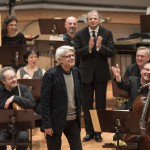By Rebecca Schmid
There has been too much music to keep up with between the Konzerthaus’ Festival Mythos Berlin and the contemporary music festival MärzMusik. At the Konzerthaus, I caught the premiere of Christian Jost’s BerlinSymphonie, an homage to the German capital in all is mercurial energy. The approximately 27-minute work for full orchestra creates a vivid enough landscape, blending minimalist textures with everything from sharp modernist gestures to snatches of smooth jazz.
Pulsating brass and a low string motive repeated above the hollow wooden sounds of a marimba capture the dark, mysterious side of Berlin—the bombed out churches, the abandoned banks of the Spree river—while lyrical woodwinds evoke its embracing thrill. Jost’s orchestration strikes an unusual balance between the accessible and the sophisticated, but it also recycles not so original ideas. A solo alto saxophone which emerges throughout the work as the soulful voice of the urban individual is at best clichéd.
The Konzerthausorchester Berlin gave a strong performance under its Music Director Iván Fischer, who since arriving in 2012 has brought the sections into impressive balance and softened the edges of an ensemble which has at times struggled with technical shortcomings. Whether or not one considers Jost a ground-breaking voice, the audience’s enthusiastic applause spoke to his communicative powers.
At the Philharmonie, MärzMusik offered contemporary music of a different breed. As part of an emphasis on the Greek composer Georges Aperghis, the ensemble Klangforum Wien performed his most recent large-scale composition 23 Situations (2013) under conductor Emilio Pomàrico. Written explicitly for the 23 musicians at hand, the work exploits a virtuosic array of extended techniques and theatrical elements.The most compelling moments emerge with vignettes for individual players, such as the siren-like sighing of the violinists, the multiphonics of heckelphone which is then slapped, the celeste player’s absurdist chanting. In passages for full ensemble, Aperghis brings forth intricate webs of variegated timbres but also cacophonic chaos that is not kind to the ear. Shrieking piccolos and the banging chords of a piano do little to enhance the drama of this approximately one-hour work.
But when the full ensemble gives a final response to the Russian-speaking interjections of the accordionist, each instrument emerges with such immediacy that one has the sense of listening to a jumbled chorus, blurring the boundaries between word and sound, theater and reality.
Fore more by Rebecca Schmid, visit www.rebeccaschmid.info
